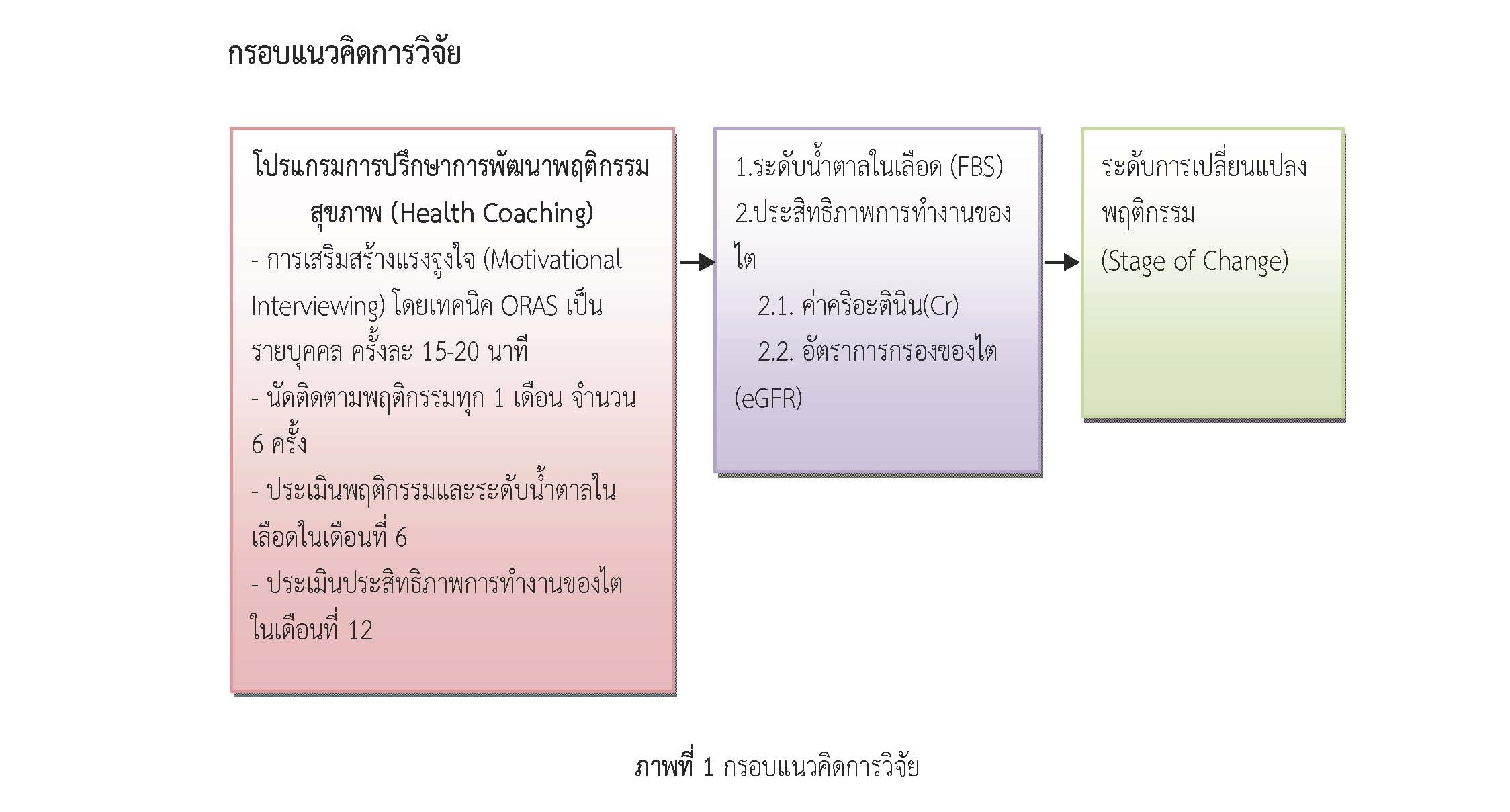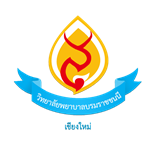The Effects of a Health Coaching Program in Controlling Fasting Blood Sugar and Estimated Glomerular Filtration Rate among Diabetes Patients
Keywords:
Health Coaching Program, Blood Sugar Levels, Glomerular Filtration Rate, DiabeticesAbstract
The objective of this quasi-experimental research was to examine the effects of a health coaching program in controlling fasting blood sugar and estimated glomerular filtration rate among diabetes patients in Rong Kwang Hospital, Phrae province. This study was conducted between June and December 2016. Participants were 30 diabetic patients who could not control their blood sugar levels, had a level of fasting blood sugar (FBS) over 180 mg%, and had a level of an estimated glomerular filtration rate (eGFR) between 30-90 ml/min/1.73 m2. The research tool was a health coaching program which included a Motivational Skills (MI) and four consulting skill. This program provided individual consultation for 15-20 minutes each time, and followed up every one month. The data collection instruments were a record form for blood glucose (FBS), serum creatinine (Cr) and glomerular filtration rate (eGFR) and the patient identification book. Health behaviors and blood sugar levels were assessed six months after enrolling the program. Kidney function was assessed one year after enrolling the program. Data was analyzed using descriptive statistics (frequency, percentages, and standard deviation) and paired T-Test. The results showed that after receiving a health coaching program, the mean scores of blood sugar levels and serum creatinine levels has a significant lower than before enrolling the program (p-value <0.05). The mean scores of the estimated glomerular filtration rates was also significant higher than before enrolling the program (p-value <0.05).This research indicated that this health coaching program can help people with diabetes to explore themselves, identify their problems, develop motivation, and motivate them to change their health behaviors. As a results, this program enhance people with diabetes to find the effective ways to control their blood sugar levels and prevent the deterioration of renal function.
References
กรมควบคุมโรค. (2563). รายงานการสำรวจสุขภาพประชาชนไทยโดยการตรวจร่างกายครั้งที่ 6 พ.ศ.2562-2563. สืบค้นจากhttps://ddc.moph.go.th/dncd/ncdstrategy/public/home/media/142เมื่อวันที่ 19 ตุลาคม 2564.
งานโรคไม่ติดต่อโรงพยาบาลร้องกวาง. (2559). รายงานสถิติประจำปี. แพร่: ม.ป.ท.
จันจิรา หินขาว และ พรฤดี นิธิรัตน์. (2563). การสัมภาษณ์เพื่อสร้างแรงจูงใจแบบกลุ่มในการปรับเปลี่ยนพฤติกรรม ผู้ที่เป็นโรคเบาหวานที่ควบคุมระดับน้ำตาลในเลือดไม่ได้. วารสารวิทยาลัยพยาบาลพระปกเกล้า จันทบุรี, 31(1), 205-212.
จุฑามาศ เทียนสะอาด. (2561). ผลของโปรแกรมการให้คำปรึกษาและการให้ความรู้ตามหลักการสัมภาษณ์ เพื่อเสริมสร้างแรงจูงใจต่อพฤติกรรมสุขภาพและผลลัพธ์ทางคลินิกในผู้ที่เป็นโรคโรคไตเรื้อรังก่อนได้รับการบำบัดทดแทนไต .วารสารการปฏิบัติการพยาบาลและการผดุงครรภ์ไทย, 5(2), 19-38.
ธวัชชัย วรพงศธร และ สุรีพันธ์ วรพงศธร. (2561). การคำนวณขนาดกลุ่มตัวอย่างสำหรับงานวิจัยโดยใช้โปรแกรมสำเร็จรูป G*power. Thailand Journal of Health Promotion and Environment Healthเมษายน-มิถุนายน 2561 สืบค้นจาก http://advisor.anamai.moph.go.th/download/Journal_health/2561/HEALTH41_2/HEALTH_Vol41No2_02.pdf.
ปิยะ วงษ์ไทยเจริญ. (2558). ผลการสัมภาษณ์เพื่อสร้างแรงจูงใจแบบกลุ่มต่อพฤติกรรมสุขภาพและระดับคอเรสเตอรอลของผู้ที่เป็นโรคความดันโลหิตสูง. วารสารราชพฤกษ์, 13(3), 91-102.
มุจลินท์ เรืองไพศาล และ กรแก้ว จันทภาษา. (2562). เหตุผลของความไม่ร่วมมือในการกินยาในมุมมองของผู้ที่เป็นโรคเบาหวานชนิดที่2: กรณีศึกษาโรงพยาบาลวาริชภูมิจังหวัดสกลนคร. วารสารเภสัชกรรมไทย, 12(2), 485.
วิจิตรา แพงชะ.(2559). ประสิทธิผลการดูแลผู้ที่เป็นโรคเบาหวานที่มีภาวะไตเสื่อมระยะ 2-4 ด้วยการจัดการรายกรณีเครือข่ายโรงพยาบาลน้ำหนาว อ.น้ำหนาว จ.เพชรบูรณ์. วารสารวิชาการแพทย์เขต 11, 31(3), 405-414.
สำนักโรคไม่ติดต่อ กรมควบคุมโรค. (2555). หลักสูตรการปรึกษาเพื่อปรับเปลี่ยนพฤติกรรมสุขภาพลดเสี่ยงลดโรคไม่ติดต่อ สำหรับบุคลากรสาธารณสุข. กรุงเทพฯ: ชุมนุมสหกรณ์การเกษตรแห่งประเทศไทย.
สำนักงานหลักประกันสุขภาพแห่งชาติ. (2554). แนวทางเวชปฏิบัติสำหรับโรคเบาหวาน พ.ศ.2554. กรุงเทพฯ: ศรีเมืองการพิมพ์ จำกัด.
อรวัลย์ เมฆเลื่อน. (2559). การศึกษาผลของการให้การปรึกษาแบบสร้างแรงจูงใจในการปรับเปลี่ยนพฤติกรรมการสูบบุหรี่ของผู้ที่เป็นโรคโรคเรื้อรังที่ได้รับการบำบัดในคลินิกสุขภาพใจ โรงพยาบาลศรีประจันต์. วารสารวิทยาลัยพยาบาลบรมราชชนนี สุพรรณบุรี, 1(1), 38-48.
อัจฉรา ภักดีพินิจ และเมตตา คำพิบูลย์. (2554). มีเพื่อนคิดชีวิตก็เปลี่ยน(พฤติกรรม). นนทบุรี: สยามศิลป์การพิมพ์.
อนุสรณ์ พยัคฆาคม และ อัจฉรา ภักดีวิจิตร. (2555). (แปลจาก Health Change Associates, 2011). To change or not to change making a dicision one way the other. From www.healthchangeassociates.com.
Prochaska and DiClemente. (2011). Prochaska and DiClemente's Stages of Change Model for Social Workers. Retrieved from https://online.yu.edu/wurzweiler/blog/prochaska-and diclementes-stages-of-change-model-for-social-workers May 11, 2011.
Miller, W.R.& Rollnick,S. (2013). Motivational Interviewing: Helping people to change (3rd Edition) Guiford Press.
Miller&Rollniek. (1991). Motivational interviewing: Preparing people to change addictive behavior. The Guilford Press.
Retrieved from https://psycnet.apa.org/record/1991-98398-000.
Saeedi, P, Petersohn, I., Salpea, P. & Malanda, B. (2019). Global and regional diabetes prevalence estimates for 2019 and projections for 2030 and 2045: Results from the International Diabetes Federation diabetes atlas, 9th edition. Diabetes Research and Clinical Practice, (157), 4.

Downloads
Published
Versions
- 2022-02-03 (2)
- 2022-02-03 (1)
How to Cite
Issue
Section
License
1. บทความหรือข้อคิดเห็นใด ๆ ที่ปรากฏในวารสารวิจัยการพยาบาลและการสาธารณสุข ที่เป็นวรรณกรรมของผู้เขียน บรรณาธิการไม่จำเป็นต้องเห็นด้วย
2. บทความที่ได้รับการตีพิมพ์ถือเป็นลิขสิทธิ์ของ วารสารวิจัยการพยาบาลและการสาธารณสุข








